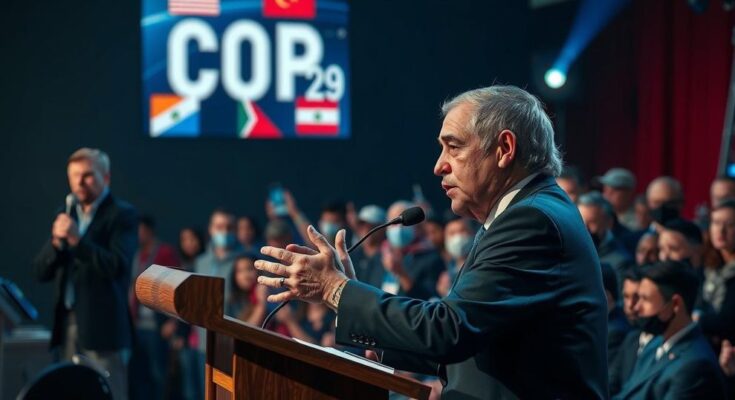President Ilham Aliyev’s confrontational rhetoric at COP29, including attacks on Western nations and advocacy for fossil fuels, has raised concerns about Azerbaijan’s commitment to the climate agenda, eliciting backlash from European officials and amplifying geopolitical tensions.
During COP29, Azerbaijan’s President Ilham Aliyev has garnered significant controversy due to his confrontational rhetoric and staunch support for fossil fuels, overshadowing the global climate agenda. Hosting the climate talks in Baku, President Aliyev’s opening address critiqued Western nations, particularly targeting France and the Netherlands, claiming they maintain neocolonial relationships with various overseas territories. His combative remarks against European institutions triggered backlash from diplomats, leading to heightened tensions between Azerbaijan and EU countries.
The backdrop of this controversy stems from Aliyev’s increasing derogatory rhetoric towards Western nations, especially following Azerbaijan’s military actions in Nagorno-Karabakh. As he positioned himself as a leader on the international stage during COP29, Aliyev’s commitment to fossil fuel production came under scrutiny amidst international calls for aggressive climate action. Moreover, Azerbaijan’s poor track record on human rights has compounded skepticism regarding its genuine dedication to addressing climate change, raising concerns about potential greenwashing at the summit.
In summary, President Ilham Aliyev’s confrontational stance at COP29 not only raised alarm regarding Azerbaijan’s commitment to climate goals but also highlighted the geopolitical implications of his rhetoric. The tensions between Azerbaijan and European nations signal a complex relationship that intertwines climate diplomacy with historical grievances and accusations of neocolonialism. If Azerbaijan continues to prioritize fossil fuel advocacy, the prospects for meaningful climate progress at COP29 could be severely undermined.
Original Source: www.euractiv.com




